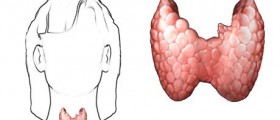
The metabolism is the rate at which our body burns calories. It is a procedure of breaking down proteins, carbohydrates, and fats to release the energy body need to function. The metabolic rate depends on the relations between the quantity of calories one takes and quantity of calories that one burns. People who eat more food than they can burn off are most likely to gain weight. However, some other symptoms may also lead to fatness, hypothyroidism, food sensitivity, Cushing's syndrome, health conditions, use of certain medications, nervousness, hypoglycemia or hyperglycemia, and lack in essential fatty acids.
Hypothyroidism
Because patients with an under-active thyroid tend to have an extremely low basal metabolic rate, one of the main symptoms of the disease is the weight gain. Extra pounds originate from fat accumulation and fluid withholding caused by protein sediments in the body. Signs of hypothyroidism are fatigue, increased sensitivity to cold, constipation, depression, paleness, sweating, dry itchy skin, low heart rate, slow speech, abnormal menstrual cycles in women, elevated serum cholesterol, acute psychosis, decreased libido and decreased sense of taste and smell.
Essential Fatty Acid Deficiency
Flaxseed oil and other foods rich in essential fatty acids are needed for production of hormones and maintaining the balanced metabolic rate. Signs of deficiency may include scaly dermatitis, alopecia, thrombocytopenia, and, in children, growth retardation. Food cravings, especially for fatty food, may also be present.
Food Sensitivity
A lot of weight is gained from the withholding fluids, most commonly caused by irritation and release of particular hormones. Food sensitivities may activate food craving to allergic people for those foods to which they are allergic. The phenomenon of simultaneous allergy and addiction to both foods and chemicals is now well accepted by doctors specializing in the analysis and treatment of allergies.
Cushing's syndrome
Progressive weight gain is the most common indication of Cushing's syndrome. It usually affects the face, neck, trunk and abdomen. Limbs are often thin in patients suffering from this syndrome. Cushing’s syndrome is often fallowed by weakness, oily skin and acne, muscle loss and weakness, bone loss (osteoporosis), high blood pressure and cardiovascular disease, psychological symptoms, infections, and development of blood clots.
Prescription Drugs
Hormone replacement therapy and estrogen-based oral contraceptives may amplify patient’s appetite or cause fluid withholding. Steroids, nonsteroidal anti-inflammatory drugs, antidepressants and diabetic medications may also cause weight gain.
Emotional Eating
This is the common reaction to stress or depression. Many people will start eating excessively for reasons other than hunger. Emotions are often triggers of eating, instead of the physical symptoms of hunger.

















Your thoughts on this
Loading...